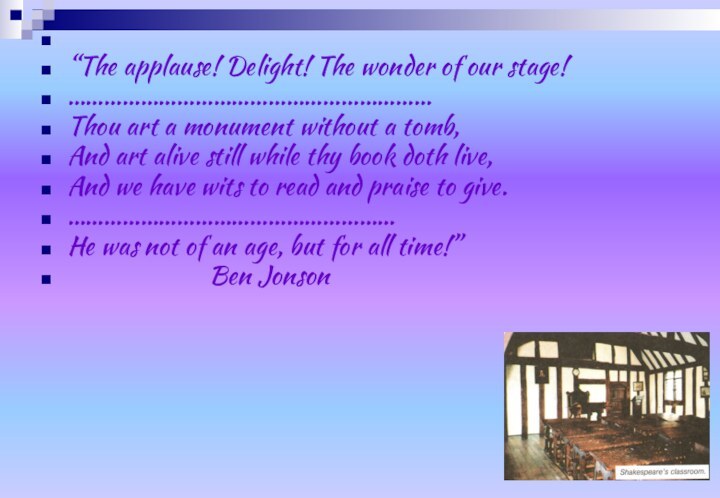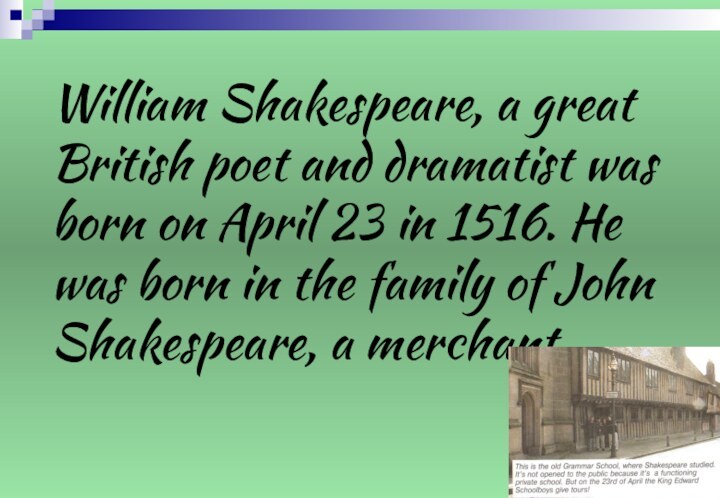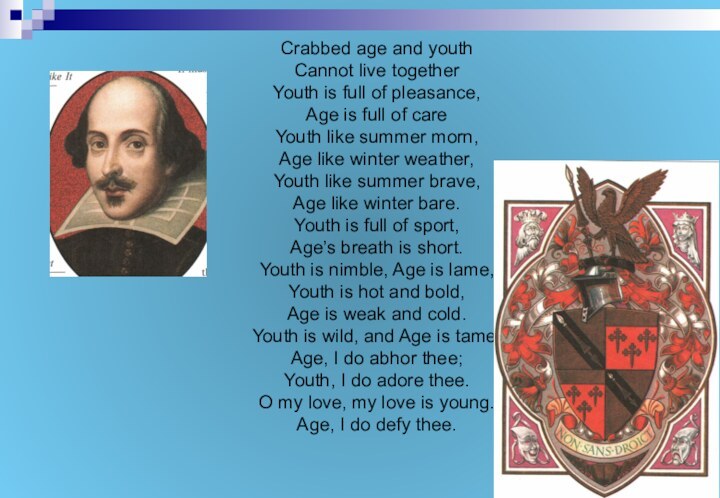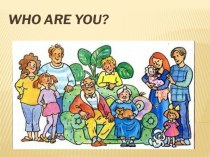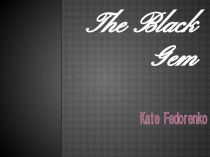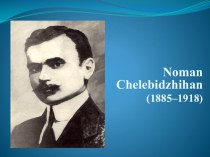Слайд 2
“The applause! Delight! The wonder of our
stage!
……………………………………………………
Thou
art a monument without a tomb,
And art alive still while thy book doth live,
And we have wits to read and praise to give.
………………………………………………
He was not of an age, but for all time!”
Ben Jonson
Слайд 3
The last half of the
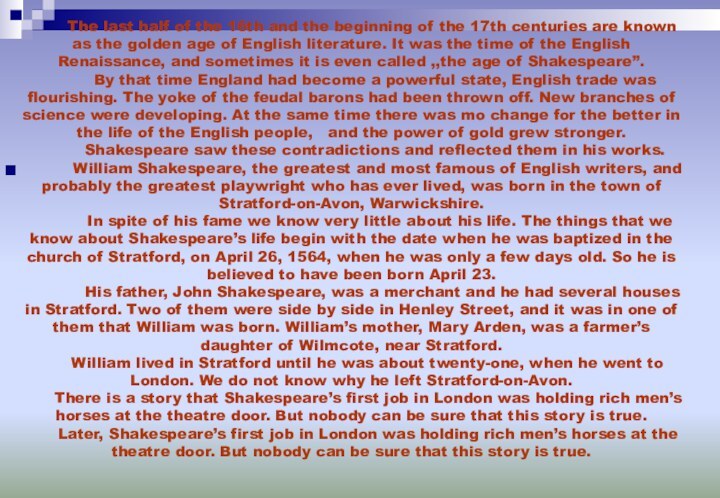
16th and the beginning of the 17th centuries are
known as the golden age of English literature. It was the time of the English Renaissance, and sometimes it is even called ,,the age of Shakespeare”.
By that time England had become a powerful state, English trade was flourishing. The yoke of the feudal barons had been thrown off. New branches of science were developing. At the same time there was mo change for the better in the life of the English people, and the power of gold grew stronger.
Shakespeare saw these contradictions and reflected them in his works.
William Shakespeare, the greatest and most famous of English writers, and probably the greatest playwright who has ever lived, was born in the town of Stratford-on-Avon, Warwickshire.
In spite of his fame we know very little about his life. The things that we know about Shakespeare’s life begin with the date when he was baptized in the church of Stratford, on April 26, 1564, when he was only a few days old. So he is believed to have been born April 23.
His father, John Shakespeare, was a merchant and he had several houses in Stratford. Two of them were side by side in Henley Street, and it was in one of them that William was born. William’s mother, Mary Arden, was a farmer’s daughter of Wilmcote, near Stratford.
William lived in Stratford until he was about twenty-one, when he went to London. We do not know why he left Stratford-on-Avon.
There is a story that Shakespeare’s first job in London was holding rich men’s horses at the theatre door. But nobody can be sure that this story is true.
Later, Shakespeare’s first job in London was holding rich men’s horses at the theatre door. But nobody can be sure that this story is true.
Слайд 4
William Shakespeare, a great British poet and dramatist
was born on April 23 in 1516. He was
born in the family of John Shakespeare, a merchant.
Слайд 5
Later, Shakespeare became an actor and a member

of one of the chief acting companies. Soon he
began to write plays for this company and in a few years became a well-known author.
Shakespeare was a good friend to his comrades in the theatre.
One writer of that time said that Shakespeare liked a quiet life, he did not like gay drunken parties, and was not fond of being invited to the court. If he was invited to the court, he was in pain.’’
Shakespeare was well know enough to make one old playwright, Robert Greene, envious of him. Greene wrote an angry pamphlet on him saying that Shakespeare was stealing other men’s plays pretending they were his own. This was not true, however, and soon afterwards the man who had published the pamphlet apologized to Shakespeare, saying that he knew how honest Shakespeare was.
The theatre at that time was more closely connected with the people than any other art. All kinds of Londoners went to the theatre and were very fond of it.
Shakespeare’s experience as an actor (although he usually acted only small parts like the Ghost in Hamlet) helped him greatly in the writing of his plays. His knowledge of the stage and his poetical genius made his plays the most wonderful ones ever written.
Слайд 6
Shakespeare wrote 37 plays. Among them there are
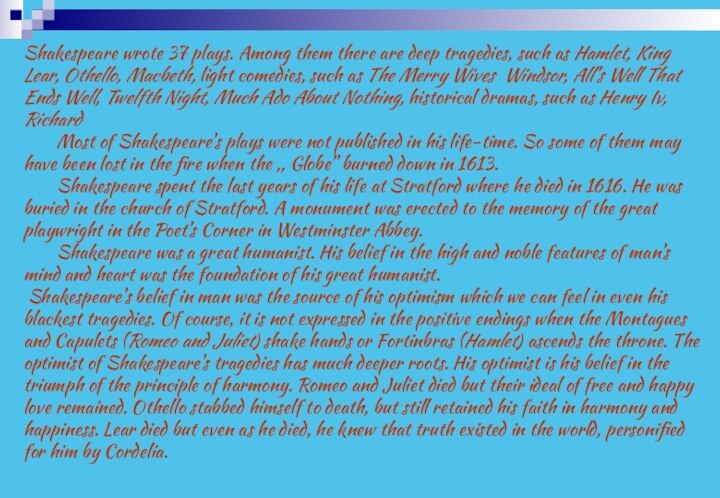
deep tragedies, such as Hamlet, King Lear, Othello, Macbeth,
light comedies, such as The Merry Wives Windsor, All’s Well That Ends Well, Twelfth Night, Much Ado About Nothing, historical dramas, such as Henry Iv, Richard
Most of Shakespeare’s plays were not published in his life-time. So some of them may have been lost in the fire when the ,, Globe’’ burned down in 1613.
Shakespeare spent the last years of his life at Stratford where he died in 1616. He was buried in the church of Stratford. A monument was erected to the memory of the great playwright in the Poet’s Corner in Westminster Abbey.
Shakespeare was a great humanist. His belief in the high and noble features of man’s mind and heart was the foundation of his great humanist.
Shakespeare’s belief in man was the source of his optimism which we can feel in even his blackest tragedies. Of course, it is not expressed in the positive endings when the Montagues and Capulets (Romeo and Juliet) shake hands or Fortinbras (Hamlet) ascends the throne. The optimist of Shakespeare’s tragedies has much deeper roots. His optimist is his belief in the triumph of the principle of harmony. Romeo and Juliet died but their ideal of free and happy love remained. Othello stabbed himself to death, but still retained his faith in harmony and happiness. Lear died but even as he died, he knew that truth existed in the world, personified for him by Cordelia.
Слайд 7
Shakespeare was a great writer. He wrote
many different kinds of plays. In his plays he
could write equally well funny scenes, and scenes of fear and excitement. The characters in Shakespeare’s plays do not seem like ,,characters in a book’’, but as if they were real people whom we could recognize at once if we met them in ordinary life instead of in the play. In fact, the names of some of Shakespeare’s characters, such as Hamlet, Othello, Romeo and many others, are known even to people who have never seen the plays in which they appear.
Pushkin and Russian revolutionary democrats highly valued Shakespeare as one of the greatest poets of the world.
Слайд 8
We have read many Shakespeare’s sonnets and
such plays: “Hamlet”, “Othello”, “ Romeo and Juliet”, “
Twelfth Night”. Most of all We like “Romeo and Juliet”, because his characters are true to life, romantic and realistic.
Shakespeare’s masterpieces help to know English better, to understand people, to learn more literature and history. His sonnets, plays and tragedies also help to solve our own problems and at the same time to escape from everyday life problems.
We adore his characters. William Shakespeare and his characters are really not of an “age but for all times as” B. Jonson said.
Слайд 9
Crabbed age and youth
Cannot live together
Youth is full
of pleasance,
Age is full of care
Youth like summer morn,
Age
like winter weather,
Youth like summer brave,
Age like winter bare.
Youth is full of sport,
Age’s breath is short.
Youth is nimble, Age is lame,
Youth is hot and bold,
Age is weak and cold.
Youth is wild, and Age is tame.
Age, I do abhor thee;
Youth, I do adore thee.
O my love, my love is young.
Age, I do defy thee.

